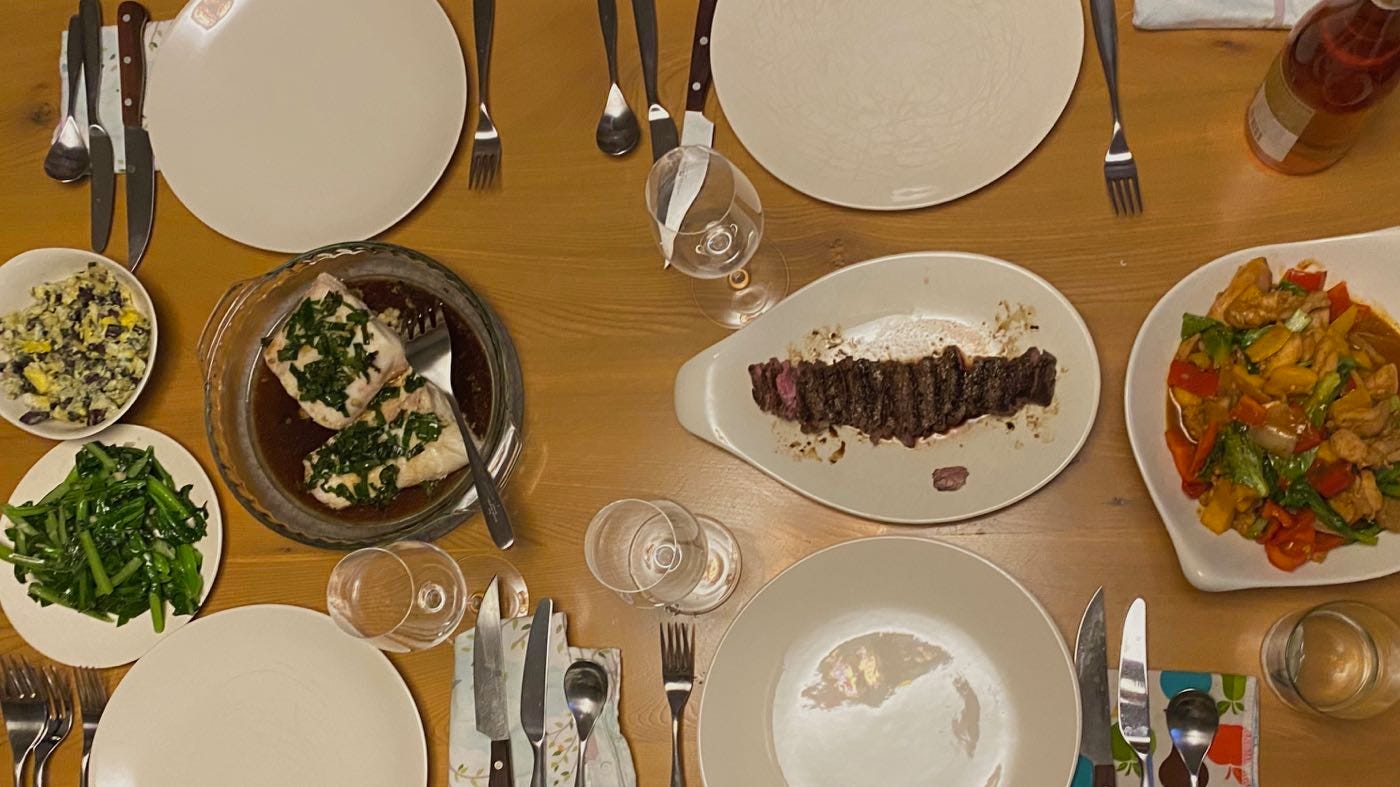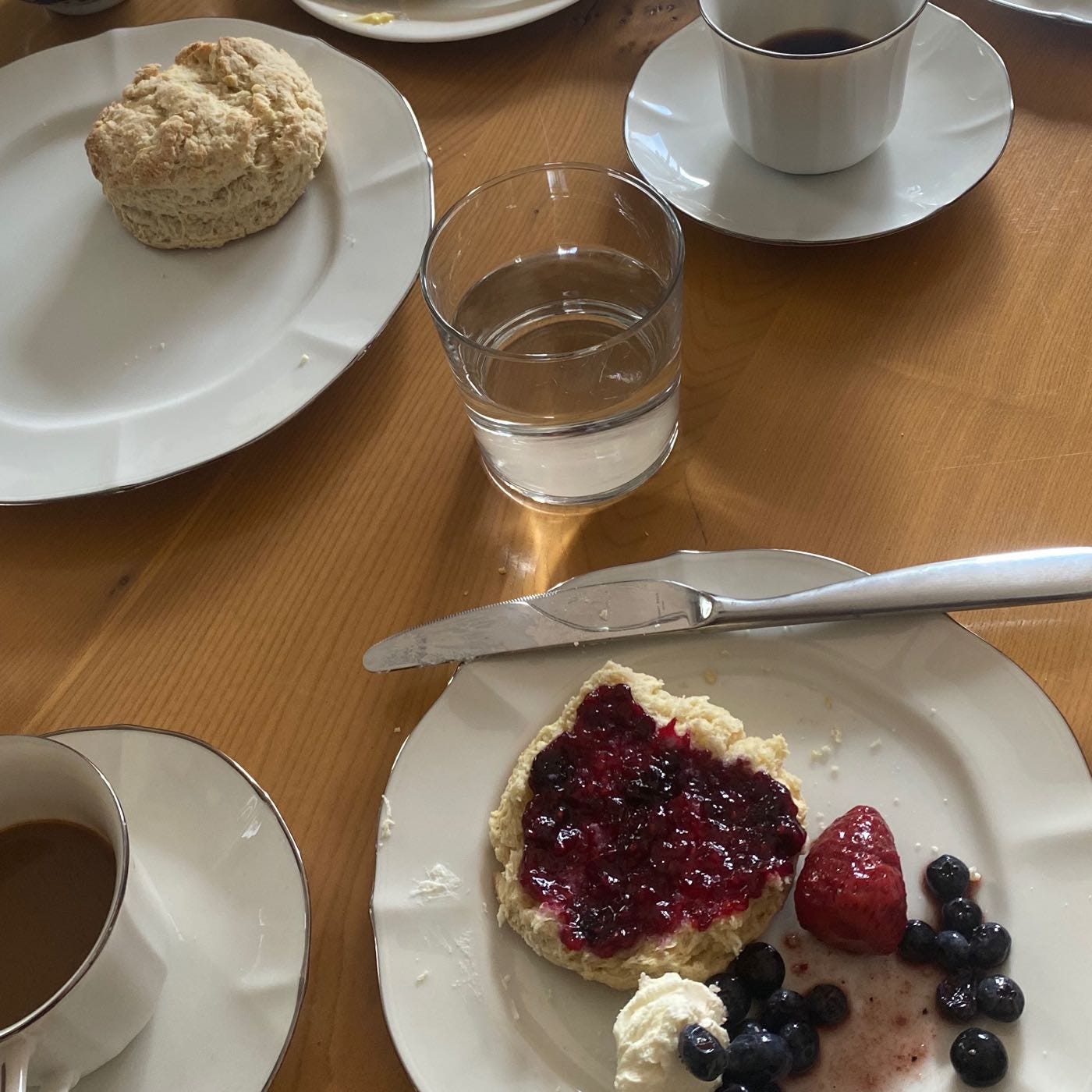We Love Most What Passes Away
Some fragmented thoughts on things that seem not to last, friends around the dining-room table, some new music, and ancient date seeds
99th Day after Coronatide*
Grand Rapids, Michigan
Hello, dear reader!
I joked to Tristan yesterday morning that I might have to get my long underwear out, because summer said goodbye to Michigan immediately after Labor Day. Though the weather forecast says that sun will return, the sky has blanketed us in gray for much of this week, the west wind has a chilly bite, and as we were walking Fozzie, we noticed the green in the trees just beginning to give way to gold.
Summer’s quick surrender got me thinking about an interview I did years ago, early in my journalism career, with the artists Christo and Jeanne-Claude. Their best-known works lasted no more than a couple of weeks before they became memories. “Surrounded Islands” spread wide skirts of flamingo-pink polypropylene around eleven islands near Miami in May 1983, while “Wrapped Reichstag” shrouded the historic Berlin parliament building in shimmering silver fabric in June 1995.
I was fortunate enough to see two of Christo and Jeanne-Claude’s temporary works in person. In February 2005, I wandered amidst “The Gates,” in New York City, a series of fluttering orange hangings over walkways in Central Park. Every Christo and Jeanne-Claude work has required years upon years of painstaking planning; snow fell partway through this exhibition, something that they could not have orchestrated, creating a bright white canvas against which the banners were unforgettably, unseasonably vibrant. Then, in 2018, we were in England when we got to see “London Mastaba,” a multicolored, 65-foot-high assemblage of old oil drums floating in the Serpentine, the lake in the middle of Hyde Park.

When I saw the Mastaba, I felt unexpected wonder: How had they transformed a pile of rusty metal into something at once imposing and ethereal? What engineering, what imagination, had gone into its creation? But seeing this work was also tinged with grief. Jeanne-Claude died in 2009, and Christo produced that piece without his wife. (The London project turned out to be the last finished in his lifetime. He died this past May, though the wrapping of the Arc de Triomphe in Paris is still scheduled to proceed as scheduled next autumn.) As we walked around the edge of the Serpentine, watching the colors change as our perspective and the sunlight shifted, I thought of something Jeanne-Claude had told me by way of explanation for their work: “We love most that which is ephemeral. We love most what passes away.”
I have some theological and eschatological questions about Jeanne-Claude’s claim. But that’s a discussion for another day—and at least in this life and on this earth, I think there’s some truth to her words. Perhaps that’s why we’ve adored Michigan summer so much, because we remember winter and know that it will return. Perhaps that’s why we so treasure brief sojourns with friends, because we know that we’ll soon have to say goodbye. Perhaps that’s why we revel in a fantastic meal, because, though you might be able to cook or order the same dish again, the circumstances around its consumption will never be the same. Perhaps that’s why a parent can simultaneously delight in and mourn the milestones of a young child’s life, because time pushes relentlessly toward adolescence and adulthood. Perhaps that’s why we cherish the beauty of a hydrangea blossom, because we know it will soon wither and dry.
Yet Christo and Jeanne-Claude invested years, even decades, in creating their works. “Surrounded Islands” was shockingly speedy for them—just three years from conception to completion. “Wrapped Reichstag” took twenty-four years, “The Gates” twenty-six. Somehow they understood that even the ephemeral isn’t really so fleeting. They knew that flowering isn’t an instantaneous event but rather the culmination of a long process and that fading isn’t a final death but instead an invitation into the new, life-giving, and ongoing beauty of memory.
In the West, time is typically viewed as linear. How often have I heard people talk about a sense of “progress”? This has never sat well with me. In my native culture, as in many Eastern cultures, time is more cyclical. This isn’t to say that we are stuck in an endless spin cycle. The Chinese conception of time allows for both circular movement as well as transformation and growth, as if the rounds were layered atop one another, like the rings of an ever-expanding tree.
If you don’t entirely get it, I’ll confess I don’t either; I’ve never been all that great at geometry or trigonometry, physics or math. Yet somewhere in my gut, I believe all this to be true. I belong to my ancestors, to their wisdom, to their joys and to their travails. As my nieces and nephews make their own journeys, they will belong to me too, long after I’ve returned to dust.
I don’t mean for this to be weirdly morbid. Amidst the griefs and the delights of this strange season, it actually gives me no small comfort to feel appropriately small. Though we bear the costs of the sins of generations past and even as we repeat some of their mistakes in our own devastating ways, we also carry the resilience of our forebears—their hopes, their testimonies, their hard-earned resilience—and we make amends that they couldn’t have imagined or might not even have seen as necessary.
The grief of loneliness tells me that we have known the joy of togetherness and gives me hope for reunion.
The grief of hunger tells me that we have glimpsed the joy of fulfillment and feeds my hope for another meal.
The grief of alienation tells me that we have tasted the joy of reconciliation and nurtures my hope for belonging.
Early in my career, not long after I interviewed Christo and Jeanne-Claude, I got a reputation for being earnest—and in a newsroom, that is no compliment. Apologies to any of you find the earnestness of all this tiresome. But I’m trying to stave off the cynicism that creeps in too easily—I confess I was on Twitter for a few minutes this week. And I’m trying to hang onto my belief in something beyond myself.
I’m also trying to figure out how to bring this to a close, but today, I don’t have a tidy end. Maybe that’s appropriate, though. The story isn’t finished. It never will be.
What I’m Growing: The tomatoes are fading, but some weeks ago, in anticipation of cooler weather, I planted some spinach and some chard as well as a few pea seeds that a friend sent me. The seedlings are just coming up. If they don’t die, I will take a picture for next week! If they do die, I will take a picture for next week!
What I’m Cooking: Our dear friends Katherine and Chris visited last weekend, after having jumped through the awkward hoops that are integral to Coronatide life: Have you been quarantining? Did you get tested? I have no words to describe what happiness it was to have them at our table, and not just because they win a special prize for having oysters shipped from Maine and then shucking them for us to share.
In my gratitude, I probably overstuffed Katherine and Chris. When I don’t have good words, I usually have food: waffles and bacon for breakfast; abalone chowder and cornbread for lunch; post-nap scones and jam and faux clotted cream; and Chinese dinner (soy-marinated steak; halibut with ginger and scallion; eggs scrambled with long bean and chive from the garden; greens with garlic; chicken stir-fried with mango, pepper, and homegrown bok choy in a slightly spicy gravy).

I use this scone recipe from the BBC’s Good Food site. And because clotted cream is near-impossible to get here, I’ve devised an acceptable substitute: mascarpone whipped with a few splashes of heavy cream.

What I’m Listening to: My friend Audrey Assad released her new album, “Eden,” last week. I love her cover of Jimmy Eat World’s “The Middle,” and I prefer her rendition of Coldplay’s “Yellow” over the original. But it’s the gorgeous title track that speaks of the renewal I have to hope in: “In the winter of our discontent/ In the ruins of our monuments/ An ancient light appearing/ Into every deadly plot we’ve laid/ Into all our bitterness and hate/ A kindness ever nearing.” Audrey has a livestream concert coming up on September 25th. Like so many of us who theoretically make a living through our creative work, this has been a season of drought. Buying a ticket to the concert is a way to support her. (Audrey will also perform at the upcoming Evolving Faith gathering that I’m co-hosting on October 2 & 3. We hope you’ll join us at that too!)
What I’m Reading: Since we’re on the theme of the cycle of life, I found some inspiration in this story of ancient date seeds that germinated after 2,000 years.
That’s all I’ve got for now. Maybe I will be more lighthearted next week. Regardless, I’m so glad we can stumble through all this together, and I’ll try to write again soon.
With annoyance at my own serious—and seriously overactive—mind but also eternal gratitude for your patience,
Jeff
*I’m still counting the days from June 1, when my governor, Gretchen Whitmer, lifted Michigan’s stay-at-home order. And I know that the linear nature of this counting exercise goes against what I’ve written above. And I know that the fact that I say we’re “after Coronatide” is a joke, because we’re not, and maybe that actually proves something about the cyclical nature of our existence. And I know I need to stop writing now. Someone, get me an editor, please and thank you—and please continue to stay safe, for the love of God and the sake of our neighbor.



